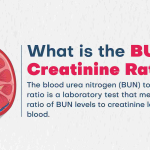Your blood test results are back, and you’re left wondering what’s going on with your kidneys. Everything seems normal – your creatinine levels are within the healthy range, and your blood urea nitrogen (BUN) is perfectly fine. But when you look closer at the ratio of BUN to creatinine, it’s higher than expected. What does this mean? Is everything really okay?
Unraveling the Mystery: High Bun/Creatinine Ratio Despite Normal Levels
In this post, we’ll delve into what a high bun/creatinine ratio indicates, even when individual levels are normal. We’ll explore common causes, potential implications for your health, and what you can do to take control of your kidney function.
What is the Bun/Creatinine Ratio, Anyway?
The BUN (blood urea nitrogen) test measures the amount of waste product in your blood, while the creatinine test evaluates your kidneys’ ability to filter out waste. The bun/creatinine ratio gives healthcare providers a better understanding of how well your kidneys are functioning. When this ratio is high, it may indicate that your kidneys are working harder than usual to clear waste from your blood – even if individual levels seem normal.
This could be due to various factors, such as dehydration, kidney damage, or certain medications. In the next section, we’ll examine some common causes of a high bun/creatinine ratio and what you can do to address them.
Your blood test results are back, and you’re left wondering what’s going on with your kidneys. Everything seems normal – your creatinine levels are within the healthy range, and your blood urea nitrogen (BUN) is perfectly fine. But when you look closer at the ratio of BUN to creatinine, it’s higher than expected. What does this mean? Is everything really okay?
Unraveling the Mystery: High Bun/Creatinine Ratio Despite Normal Levels
In this post, we’ll delve into what a high bun/creatinine ratio indicates, even when individual levels are normal. We’ll explore common causes, potential implications for your health, and what you can do to take control of your kidney function.
What is the Bun/Creatinine Ratio, Anyway?
The BUN (blood urea nitrogen) test measures the amount of waste product in your blood, while the creatinine test evaluates your kidneys’ ability to filter out waste. The bun/creatinine ratio gives healthcare providers a better understanding of how well your kidneys are functioning. When this ratio is high, it may indicate that your kidneys are working harder than usual to clear waste from your blood – even if individual levels seem normal.
This could be due to various factors, such as dehydration, kidney damage, or certain medications. Let’s take a closer look at some common causes of a high bun/creatinine ratio:
Dehydration: If you’re not drinking enough water, your kidneys may work harder to concentrate your urine and eliminate waste products. This can lead to a high bun/creatinine ratio.
Kidney damage: Conditions like kidney stones, glomerulonephritis, or polycystic kidney disease (PKD) can cause the kidneys to work harder, leading to a high bun/creatinine ratio.
Certain medications: Certain diuretics, such as furosemide (Lasix), and some antibiotics like gentamicin can cause your kidneys to work harder, increasing the bun/creatinine ratio.
It’s essential to note that a high bun/creatinine ratio doesn’t always indicate kidney disease. However, it may be a sign of underlying kidney issues or other health problems. If you’re concerned about your results or have any questions, consult with your healthcare provider for personalized guidance.
You can learn more about the importance of monitoring your kidney function by visiting the National Kidney Foundation‘s website.
What’s Next?
In our next section, we’ll explore what you can do to address a high bun/creatinine ratio and take control of your kidney health. Stay tuned!
Get Expert Consultation for Your Blood Test Concerns
We are ready to answer your questions, day or night.
Start chatIn conclusion, a high bun/creatinine ratio despite normal BUN and creatinine levels is not always a cause for alarm, but it does warrant further investigation. By understanding the underlying causes of this ratio, you can take proactive steps to maintain healthy kidney function.
Take control of your health by staying hydrated, avoiding medications that may exacerbate the issue, and maintaining a balanced diet. If you have concerns about your blood test results or kidney function, consult with your healthcare provider for personalized guidance.
Remember, early detection and intervention can make all the difference in preserving kidney health. Don’t hesitate to ask questions or seek a second opinion if you’re unsure about any aspect of your care.
A Final Word
Your kidneys are incredibly resilient organs, capable of adapting to changes in your body. By prioritizing your overall health and taking proactive steps to support kidney function, you can help ensure they continue to thrive for years to come.
Stay informed, stay vigilant, and give your kidneys the care they deserve. With the right approach, you can maintain optimal kidney health and enjoy a lifetime of well-being.
He is a fool and that should answer all your questions: Get ready for a thought-provoking read! Dive into the fascinating topic of understanding people’s actions and motivations. Explore what drives human behavior and how you can apply these insights to your own life.
Average core body temperature: Are you curious about the ideal body temperature? Learn more about what it means for your overall health and how it relates to everyday activities. Don’t miss this essential piece of information!



